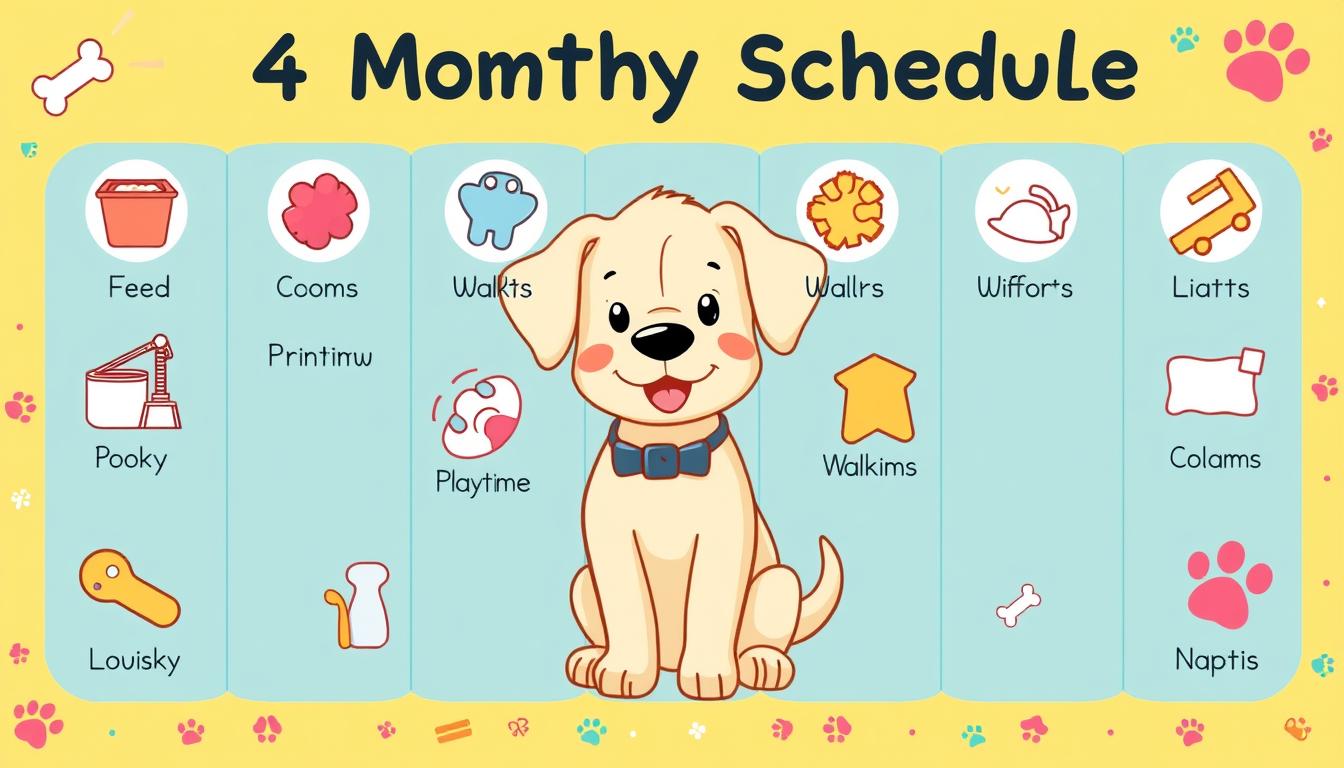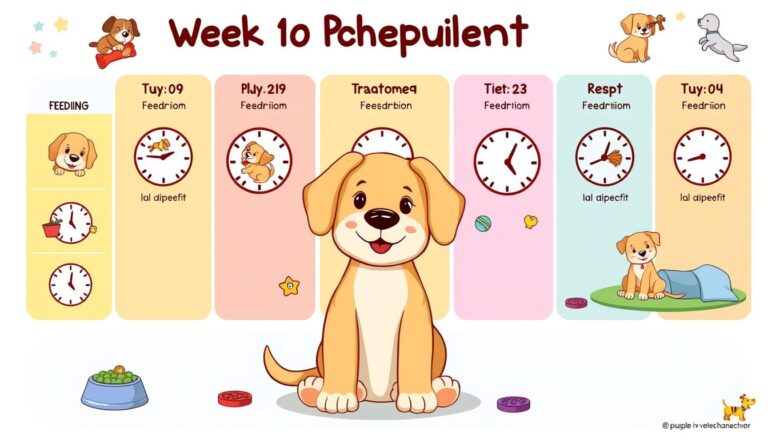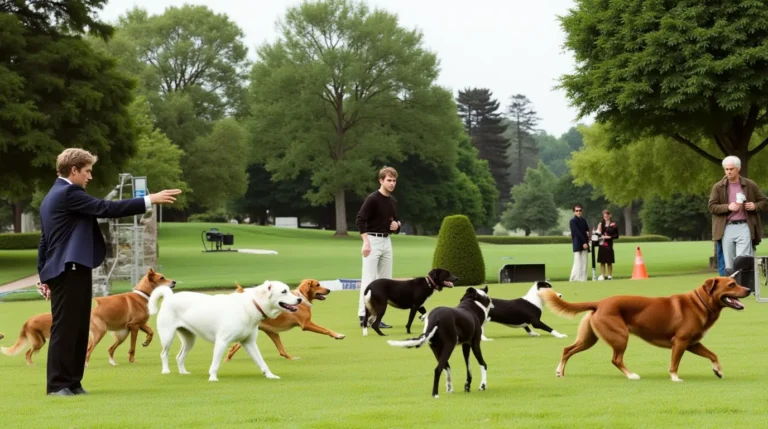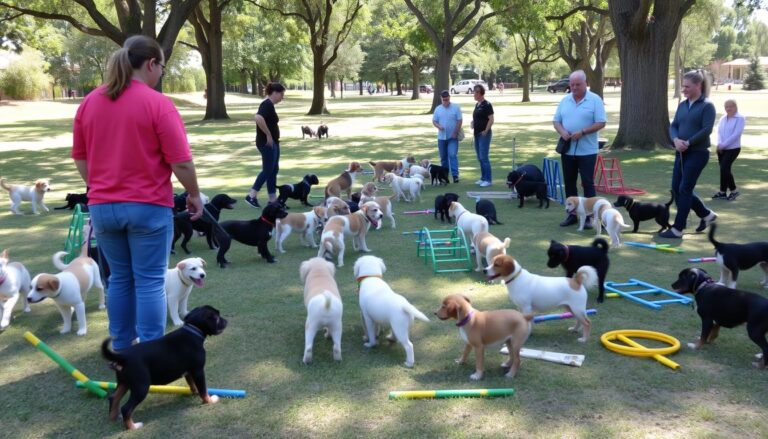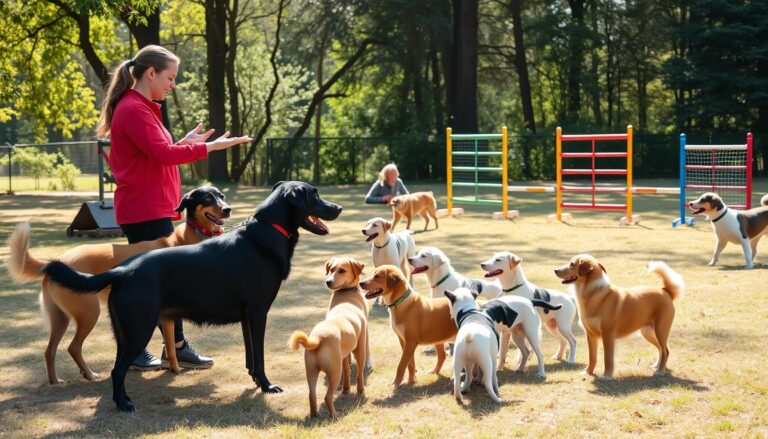4 Month Old Puppy Schedule: Essential Tips for Training and Care
4 Month Old Puppy Schedule: Essential Tips for Training and Care
Starting a routine for your four-month-old puppy can seem daunting. But, a good puppy schedule is vital for their growth and training. These early months are crucial, and your choices will shape their future behavior and health.
When I brought home my puppy, Buddy, at four months, he was full of energy and curiosity. A daily routine helped us overcome early challenges. Now, he’s a well-adjusted, well-trained dog. The effort was worth it for his happiness and health.
Key Takeaways:
- A structured 4 month old puppy schedule is crucial for their development and training
- Establishing a consistent routine helps build good habits and minimizes behavioral issues
- Proper care and attention during this critical stage lays the foundation for a well-behaved adult dog
- Understanding your puppy’s developmental milestones can guide your training and activities
- Balancing exercise, playtime, potty breaks, and rest is key to a happy, healthy pup
Understanding Your 4 Month Old Puppy’s Development Milestones
When your puppy hits 4 months, you’ll see big changes in their growth. This time is key for their future behavior and growth. It’s important to know the milestones they’re reaching.
Physical Development at Four Months
At 4 months, your puppy grows fast. Their bones and muscles grow quickly. You’ll see big changes in their size and shape.
It’s crucial to feed them well and give them enough exercise. This helps their growth and development.
Mental and Social Growth Stages
Your 4 month old puppy is also growing mentally and socially. This is a key time for learning to interact with others. Giving them positive experiences and training is vital for their future.
What to Expect from Your Puppy
As your puppy grows, you’ll see new behaviors. They might become more independent and playful. But, they might also chew more and seek attention.
Being patient and consistent is key. Positive reinforcement helps a lot during this time.
Knowing about your puppy’s growth milestones helps you support them. This ensures a smooth transition to the next stage of their life.
Creating the Perfect 4 Month Old Puppy Schedule
Creating a daily routine is key for your 4 month old puppy’s health and training. A structured puppy schedule ensures your puppy gets the right mix of daily routine, play, rest, and potty breaks. This helps your puppy feel safe and supports their physical, mental, and social time management.
To create the best schedule for your 4 month old puppy, consider these important points:
- Consistent Feeding Times: Feed your puppy at the same times each day to keep their hunger and digestion in check.
- Dedicated Potty Breaks: Take your puppy to their potty area at regular times, like after meals, naps, and play, to help with potty training.
- Structured Exercise and Playtime: Set aside specific times for physical activity, mental play, and interactive fun to meet your puppy’s needs.
- Scheduled Nap and Rest Periods: Puppies sleep a lot, so plan for short naps throughout the day to avoid tiredness and bad behavior.
- Consistent Bedtime: Create a predictable bedtime routine to help your puppy relax and get the rest they need.
By sticking to a well-structured daily routine and puppy schedule, you support your 4-month-old’s growth and training. It also brings security and predictability to both you and your puppy.
“A consistent routine helps puppies feel safe and secure, which in turn supports their overall development and well-being.”
Essential Morning Routine for Your Puppy
Creating a consistent morning routine is key for your 4 month old puppy’s well-being. It starts from waking up to their first meal. A structured schedule makes them feel secure and supports their growth.
Early Morning Activities
Begin your puppy’s day with a quick potty break. Take them outside right after they wake up. This helps them learn to go to the bathroom in the right place. It also prevents accidents inside.
Breakfast and Post-Meal Care
After the potty break, it’s time for their morning routine. Give them a nutritious puppy feeding to keep their body and mind active. Watch how they eat and clean up any messes to keep things tidy.
Morning Exercise Guidelines
- Take your puppy for a short exercise routine after their meal. It helps with digestion and keeps them active.
- Play light games like fetch or a short leash walk. It stimulates their senses and burns off energy.
- Keep the morning exercise short, 15-20 minutes. This prevents them from getting too tired.
By sticking to this morning routine, your 4 month old puppy will have a great day. They’ll learn, explore, and rest well. Consistency is important for their happiness and growth.
Daytime Activities and Training Sessions
As your 4 month old puppy grows, they need lots of daytime fun and learning. These activities help with puppy training, socialization, and mental stimulation. They learn important skills and stay happy and healthy.
Begin the day with a short training session. Teach basic commands like “sit,” “stay,” and “come.” Use treats and praise to make learning fun. As your puppy gets better, you can make the lessons longer and harder.
- Take your puppy on outings to meet new people and animals. Visit pet stores, parks, or go for walks. This helps them get used to different things.
- Give them puzzles and toys that challenge their minds. This keeps them busy and happy.
- Make time for play. Play games like fetch or tug-of-war. It helps them burn energy and bond with you.
A good day includes training, socializing, and fun activities. This helps your puppy grow up happy and healthy.
“Positive reinforcement and a variety of engaging activities are key to raising a well-adjusted and confident puppy.”
Establishing an Effective Potty Training Routine
Potty training your 4 month old puppy is key to their growth. It helps avoid accidents later on. By watching for signs and sticking to a routine, you can train your puppy well. This keeps your home clean and your puppy happy.
Signs Your Puppy Needs to Go
Watch for signs your puppy needs to go. Look for sniffing, circling, or heading towards the door. When you see these signs, take your puppy outside right away.
Creating a Consistent Schedule
Consistency is crucial for puppy potty training. Create a routine for your puppy. Take them out in the morning, after meals, after play, and before bed. This helps them learn when and where to go.
Handling Accidents Properly
Accidents can still happen during accident prevention. Stay calm and clean the area well with an enzymatic cleaner. This removes smells that might attract your puppy. Don’t punish your puppy. It can hurt their trust and make training harder.
By watching for signs, sticking to a routine, and handling accidents right, you can train your puppy well. This helps them learn good bathroom habits.
Feeding Guidelines and Nutritional Needs
As your 4 month old puppy grows, their puppy nutrition and feeding schedule become key for their health. Proper dietary requirements help your puppy get the nutrients they need to grow well.
Puppies at this age need three to four meals a day. These meals should be spread out to match their fast growth and high energy. Talk to your vet to find out the right amount of food for your puppy, based on their breed, size, and how active they are.
| Nutrient | Importance for Puppies |
| Protein | Supports muscle development and growth |
| Fats | Provides energy and aids in the absorption of fat-soluble vitamins |
| Carbohydrates | Supplies additional energy for active puppies |
| Calcium and Phosphorus | Crucial for strong bones and teeth |
| Vitamins and Minerals | Supports overall health and immune function |
When picking a puppy food, choose one made for growing puppies. Ask your vet or a pet nutrition expert to make sure you’re giving your 4-month-old the right food.
“Proper nutrition is the foundation for a healthy, happy puppy. Feed your 4-month-old the right diet, and you’ll set them up for a lifetime of wellness.”
Exercise Requirements and Play Time
It’s important to give your 4 month old puppy enough physical activity and mental challenges. Their exercise should match their age and energy. This keeps them active without overdoing it.
Appropriate Exercise Duration
Your puppy needs short, frequent play sessions. Aim for 5-10 minutes of play several times a day. As they grow, you can increase the time. But, avoid long, hard activities that could hurt their bones and muscles.
Best Activities for Mental Stimulation
- Puzzle toys and food-dispensing toys to encourage problem-solving and foraging behaviors
- Gentle tug-of-war games to engage their natural prey drive
- Nosework activities, such as hiding treats for them to sniff out
- Socialization with people and other well-behaved pets in controlled settings
Safe Play Practices
When it’s time for puppy play, safety comes first. Always watch your pup closely and avoid rough play. Introduce new toys and games slowly. Make sure the play area is safe from dangers.
| Puppy Exercise Tip | Explanation |
| Limit exercise duration | Puppies have delicate bones and muscles that can be easily strained by overexertion. |
| Prioritize mental stimulation | Challenging your puppy’s mind is just as important as physical activity for their overall development. |
| Supervise playtime | Ensure your puppy’s safety by closely monitoring their activities and interactions. |
“A tired puppy is a well-behaved puppy. Striking the right balance between physical and mental exercise is key to raising a happy, healthy pup.”
Evening Wind-Down and Bedtime Routine
As the day ends, your 4 month old puppy needs a steady evening routine for a good night’s sleep. A calm bedtime ritual is key for their puppy bedtime routine and sleep schedule.
Start the nighttime care by dimming the lights and stopping stimulating activities an hour or two before bedtime. Play gentle games or do light training to help them relax. This ensures they’re ready for a good night’s sleep.
- Take your puppy outside for a final potty break around 30 minutes before bedtime.
- Provide a comfortable, quiet sleeping area with their favorite toys and a cozy bed.
- Consider using a white noise machine or playing soft, soothing music to help your puppy drift off to sleep.
Being consistent is crucial for your puppy’s bedtime routine. Stick to the same schedule every night. Your puppy will learn it’s time to settle down and rest.
“A well-rested puppy is a happy, healthy puppy.”
By setting up a calming evening wind-down and bedtime routine, you’ll help your 4 month old puppy succeed. They’ll get the quality sleep schedule they need to thrive.
Common Behavioral Challenges and Solutions
Your 4 month old puppy is growing and exploring. You might face some common behavioral challenges. But, with the right training and a consistent schedule, you can solve these problems. This will help your puppy become a well-behaved friend.
Managing Puppy Biting
Puppy biting is normal as they explore and teethe. To stop this puppy behavior problem, give them chew toys. Redirect their biting to these toys. Use the “no” command and reward them when they stop biting.
Being patient and consistent is crucial in this training solution.
Dealing with Separation Anxiety
Separation anxiety is common in 4-month-old puppies. Start by leaving them alone for short times and gradually increase it. Give them toys and treats to keep them occupied.
Make being alone a positive experience. A consistent dog training schedule can also help with separation anxiety.
Addressing Excessive Barking
Excessive barking can be a problem. But, it’s often a normal puppy behavior. Teach your puppy the “quiet” command and reward them when they stop barking.
Make sure they get enough play and mental stimulation. This will prevent boredom and excessive barking. With patience and the right training solutions, you can solve this puppy behavior problem.
By tackling these common challenges with a consistent dog training schedule and the right training solutions, your 4 month old puppy will become a well-behaved and happy friend.
Conclusion
Following a 4 month old puppy schedule is key for their health and training. This guide has given you the tools to care for your puppy. It covers morning routines to evening wind-downs.
Learning to manage your puppy’s behavior and nutrition is crucial. Consistency is the core of puppy care tips and training success. A daily routine and positive reinforcement help your puppy grow well.
Starting this journey with your 4 month old puppy is exciting. Be ready for challenges and celebrate the big moments. With patience and the knowledge from this article, you’ll raise a happy and well-behaved friend.
FAQ
What is the ideal daily schedule for a 4 month old puppy?
A structured daily schedule is key for a 4 month old puppy. It should include regular meals, potty breaks, exercise, socialization, and training. This ensures your puppy’s needs are met all day.
How much exercise does a 4 month old puppy need?
Puppies at this age need moderate exercise. Aim for 5-10 minutes of activity several times a day. This can be short walks, playtime, and mental games to keep them active and engaged.
What should I feed my 4 month old puppy?
Puppies need specific nutrients for growth. Feed your 4 month old puppy a high-quality, puppy-specific diet. Give them three meals a day with the right portion sizes.
How do I establish an effective potty training routine for a 4 month old puppy?
Consistent potty training is vital at this age. Create a schedule for frequent trips outside. Reward your puppy for successful potty breaks. Be patient and consistent with accidents. Crate training can also help with potty training.
How can I manage common behavioral issues with my 4 month old puppy?
Biting, separation anxiety, and excessive barking are common issues. Use positive reinforcement training to address these. Provide the right chew toys and help your puppy get used to being alone.
What are the key developmental milestones for a 4 month old puppy?
At 4 months, puppies grow fast physically, mentally, and socially. They improve their coordination, learn basic commands, and need socialization with people and animals.

